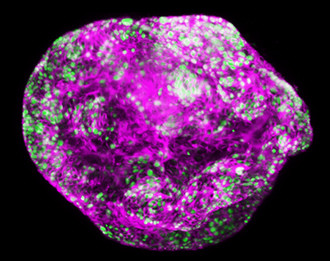Cancer prevention gene the 'odd one out' in its family

Melbourne researchers have shown that a gene called NF-κB1 is critical for the prevention of stomach cancers — which is surprising given that other proteins in its family are known to drive cancer development.
Stomach (gastric) cancers are relatively common in Australia, with around 2000 cases diagnosed each year. The disease is often not diagnosed until an advanced stage, with many stomach cancers developing as a result of uncontrolled inflammation over many years.
According to Dr Lorraine O’Reilly from the Walter and Eliza Hall Institute, who co-led the new study, previous research has shown that high levels of activity of other NF-κB family members were drivers of stomach and other cancers. She noted, “Until now, it was thought that abnormally increased activity and levels of any of the members of the NF-κB family was linked to cancer.”
But when the researchers switched off the NF-κB1 gene, its abnormally low expression actually resulted in the spontaneous development of stomach cancers, making it the ‘odd one out’ in its family.
“We found that defects that led to lower than normal levels of NF-κB1 kick-started uncontrolled inflammation in the stomach and, over the long term, led to invasive stomach cancers,” Dr O’Reilly said.
Published in the journal Immunity, the findings have ramifications for the understanding and treatment of human cancers. For example, said Dr O’Reilly, “It is well established that long-term inflammation can lead to stomach cancer in humans. The cellular processes that we have identified in this study as being important for the development of stomach cancer provide new targets for therapy that have not been explored before.”
Co-lead researcher Dr Tracy Putoczki added that the team’s preclinical model will be very useful for testing new cancer treatment options — such as immunotherapy, which is still in its infancy when it comes to stomach cancer.
“This is the first preclinical model of stomach cancer that repeats the pattern of human stomach cancer development, that involves progression from chronic stomach inflammation through to fully invasive cancer,” Dr Putoczki said.
“We showed that there are markers on these stomach tumour cells that indicate they would be responsive to a type of immunotherapy called immune checkpoint inhibitors, in particular anti-PDL1 immunotherapy, which is already used with great success in the treatment of melanoma and certain other cancers.
“Not only does this research provide compelling evidence for further investigation of immunotherapy for treating stomach cancer, it also provides the first model for preclinical testing of these treatments.”
Babies of stressed mothers likely to get their teeth earlier
Maternal stress during pregnancy can speed up the timing of teeth eruption, which may be an early...
Customised immune cells used to fight brain cancer
Researchers have developed CAR-T cells — ie, genetically modified immune cells manufactured...
Elevated blood protein levels predict mortality
Proteins that play key roles in the development of diseases such as cancer and inflammation may...





